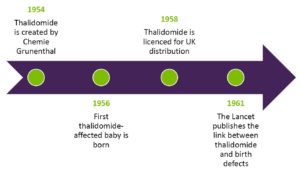 The Legacy Of Thalidomide
The Legacy Of Thalidomide
Aims
A multidisciplinary meeting was held at the University of York in September 2016 and was attended by beneficiaries, historians, scientists, clinicians, and social scientists to explore what lessons can be learned from the history and use of the drug, its impact and ongoing consequences today; and how this knowledge can benefit thalidomide survivors and others with rare impairments.
What was found
The meeting had three sessions, each highlighting different perspectives: historical, contemporary, and personal. Professor Karl Atkin, Head of the Department of Health Sciences at the University of York, opened the day. He remarked on the importance of understanding the life course when making sense of long-term conditions, and in particular, how ageing with a disability creates specific disadvantages which need to be addressed.
The information presented at the meeting showed that there is still much to learn from thalidomide, both from its complex history and its impact on peoples’ lives today. For thalidomide survivors, the original impairments caused by the drug are being compounded by the consequences of a lifetime of living with a rare dis- ability, and early onset age-related health problems. Their health and functioning is changing, and this has profound implications for their quality of life and need for health and social care services.
View the full published article here:
Legacy of Thalidomide Meeting Report 2017


